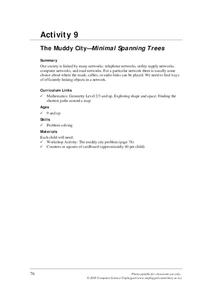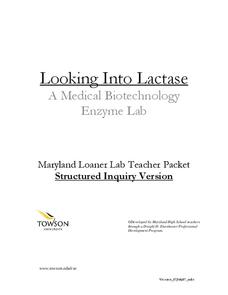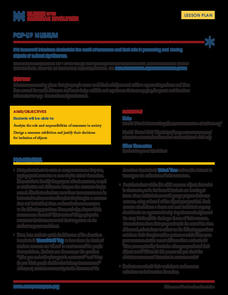University of Oklahoma
Understanding My Individualized Education Program
The final unit the series helps learners become familiar with the major components and vocabulary in their IEPs. Using a KWL chart, class members record information about their IEPs and set goals for themselves.
Teaching Tolerance
Where We Stand
Everyone is entitled to their own opinion. Academics learn strategies to share their opinions and agree or disagree with others in a respectful manner. The resource provides scenarios to help individuals form opinions and share them with...
University of Texas
What Are Calories?
What are calories, and how do calorie needs differ from person to person? Here is a worksheet that briefly explains how calories measure the energy supplied by food, as well as suggests the amount of food an individual should eat per day.
PBS
The Little Red Hen: A Tale of Cooperation
Ensure that your kids don't even consider saying "Not me!" when it comes time to read by engaging them in this set of lesson plans based around "The Little Red Hen." The class reads the story together before starting in on additional...
Computer Science Unplugged
The Muddy City—Minimal Spanning Trees
What is the most efficient way to ensure everyone is connected? Individual pupils determine the least expensive route to pave roads in a fictional city. In doing so, they learn to find the minimal spanning tree for the situation. They...
Code.org
APIs and Using Functions with Parameters
Introduce your class to the API, a reference guide that lists and explains the functionality of programming language. Using JavaScript, individuals draw complex designs that require additional commands and parameters defined in the API...
EngageNY
The Long Division Algorithm
Two methods are always better than one! The eighth installment in this series asks pupils to convert decimals to fractions using two approaches. Individuals first use the more traditional approach of long division and then use reverse...
Towson University
Looking Into Lactase: Structured Inquiry
Why is lactase important? Biology scholars explore enzyme function in a structured inquiry lab. The activity tasks lab groups with observing how temperature and pH affect enzyme activity, as well as determining which milk products...
Howard Hughes Medical Institute
The Eukaryotic Cell Cycle and Cancer
How does cancer begin, and why can it get so out of control? Curious young cytologists use an interactive resource to study the cell cycle. After reviewing the background information, individuals go step-by-step through the process of...
US Department of Veterans Affairs
Veterans Day
Teaching class members all about the importance and meaning behind Veterans Day with an informative resource. Pupils complete a classroom activity guide and individual research to learn more about the brave men and women who defend the...
Nemours KidsHealth
Screen Time: Grades 9-12
Two engaging activities encourage teens to turn off their screens and tune into healthy activities. Learners use a tracker to assess their daily screen-time habits, read several articles about the value of exercise, then research the...
Flipped Math
Calculus AB/BC - Determining Intervals on Which a Function is Increasing or Decreasing
Going up? Wait, it might be going down! Learners watch a video to see how to use the derivative and critical points to find where a function is either increasing or decreasing. Individuals use the rate of change to solve real-world...
Flipped Math
Calculus AB/BC - Introduction to Optimization Problems
Let's get the equation set. Pupils see the importance of setting up an one-variable equation in the first of two lessons on optimization problems. The presenter works four different types of problems before individuals use the included...
Newseum
The Women Who Made the Movement
Granting women the right to vote was a long time coming and took many efforts. Young historians select one woman involved in the suffrage movement to research. They compare and contrast the depictions of their subject in mainstream and...
Federal Reserve Bank
Creating a Budget
Learning to create and maintain a budget is an important life skill. Guide individuals in the discovery of their spending habits and how to track them. They then use what they learned to create a budget and make decisions on where they...
CK-12 Foundation
Testing Hypotheses: Einstein
Einstein once said "A person who never made a mistake never tried anything new." Enlist his help in teaching young learners the importance of looking for mistakes in hypotheses. An interactive coaches pupils in the falsifiability of...
Biology Junction
Nucleic Acids
Genetic information transfers through nucleic acids, making these the chemical link that connects people to their parents and grandparents. Viewers determine the importance of both DNA and RNA after observing the presentation. Key...
Judicial Learning Center
Judicial Independence: What’s Wrong with This Court?
Why is it important for judges to operate independently of politics or other branches of government? Scholars ponder the question as they examine video clips, case studies, excerpts of the US Constitution, and an interactive computer...
Science Matters
Formative Assessment #4: Body Chart
The body is one big life-sized puzzle! A hands-on lesson builds on the idea and has individuals create life-size models of the body including all important organs of the digestive, circulatory, and respiratory systems. After building...
American Museum of Natural History
Keeping a Field Journal
Recording scientific evidence allows for important discoveries and conclusions. A remote learning resource outlines how to create a field journal to record scientific observations. The outline resource includes notation about the...
American Museum of Natural History
What is Biodiversity?
Not all dogs are the same just like not all finches are the same. An interactive online lesson helps individuals learn about the causes and limitations to biodiversity. The clickable sections describe the basics of the genetics of...
Western Justice Center
Self Awareness
Being aware of one's perceptions and biases is especially important when involved in a conflict. After watching an introductory video and four scenarios, viewers write out how they would feel or react to each situation. The subsequent...
DocsTeach
Patent Analysis: J.W. Davis and Levi Strauss's Fastening Pocket Openings
Commonplace today, the zipper and button construction of blue jeans was a major innovation. Using the patent for the J.W. Davis and Levi Strauss innovation, individuals comb an image of the fly for clues. Afterward, they discuss its...
Museum of the American Revolution
Pop-Up Museum
Museums offer more than interesting exhibits—they are key to keeping history alive. An immersive activity uses a virtual field trip to show academics the importance of museums in preserving history. Young historians learn how museums are...

























